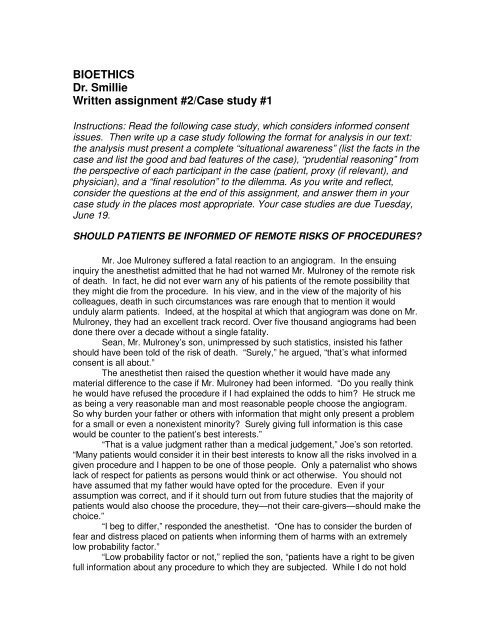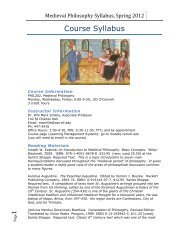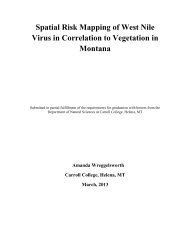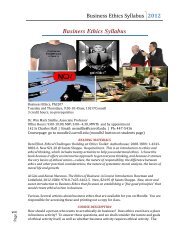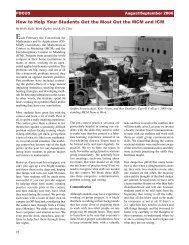BIOETHICS Dr. Smillie Written assignment #2/Case study #1
BIOETHICS Dr. Smillie Written assignment #2/Case study #1
BIOETHICS Dr. Smillie Written assignment #2/Case study #1
You also want an ePaper? Increase the reach of your titles
YUMPU automatically turns print PDFs into web optimized ePapers that Google loves.
<strong>BIOETHICS</strong><strong>Dr</strong>. <strong>Smillie</strong><strong>Written</strong> <strong>assignment</strong> <strong>#2</strong>/<strong>Case</strong> <strong>study</strong> <strong>#1</strong>Instructions: Read the following case <strong>study</strong>, which considers informed consentissues. Then write up a case <strong>study</strong> following the format for analysis in our text:the analysis must present a complete “situational awareness” (list the facts in thecase and list the good and bad features of the case), “prudential reasoning” fromthe perspective of each participant in the case (patient, proxy (if relevant), andphysician), and a “final resolution” to the dilemma. As you write and reflect,consider the questions at the end of this <strong>assignment</strong>, and answer them in yourcase <strong>study</strong> in the places most appropriate. Your case studies are due Tuesday,June 19.SHOULD PATIENTS BE INFORMED OF REMOTE RISKS OF PROCEDURES?Mr. Joe Mulroney suffered a fatal reaction to an angiogram. In the ensuinginquiry the anesthetist admitted that he had not warned Mr. Mulroney of the remote riskof death. In fact, he did not ever warn any of his patients of the remote possibility thatthey might die from the procedure. In his view, and in the view of the majority of hiscolleagues, death in such circumstances was rare enough that to mention it wouldunduly alarm patients. Indeed, at the hospital at which that angiogram was done on Mr.Mulroney, they had an excellent track record. Over five thousand angiograms had beendone there over a decade without a single fatality.Sean, Mr. Mulroney’s son, unimpressed by such statistics, insisted his fathershould have been told of the risk of death. “Surely,” he argued, “that’s what informedconsent is all about.”The anesthetist then raised the question whether it would have made anymaterial difference to the case if Mr. Mulroney had been informed. “Do you really thinkhe would have refused the procedure if I had explained the odds to him? He struck meas being a very reasonable man and most reasonable people choose the angiogram.So why burden your father or others with information that might only present a problemfor a small or even a nonexistent minority? Surely giving full information is this casewould be counter to the patient’s best interests.”“That is a value judgment rather than a medical judgement,” Joe’s son retorted.“Many patients would consider it in their best interests to know all the risks involved in agiven procedure and I happen to be one of those people. Only a paternalist who showslack of respect for patients as persons would think or act otherwise. You should nothave assumed that my father would have opted for the procedure. Even if yourassumption was correct, and if it should turn out from future studies that the majority ofpatients would also choose the procedure, they—not their care-givers—should make thechoice.”“I beg to differ,” responded the anesthetist. “One has to consider the burden offear and distress placed on patients when informing them of harms with an extremelylow probability factor.”“Low probability factor or not,” replied the son, “patients have a right to be givenfull information about any procedure to which they are subjected. While I do not hold
you responsible for my father’s death, I think you were delinquent in your duty as apractitioner in failing to apprise him of the risk involved, however remote. While theremight be rare exceptions to informing patients about remote risks, the practice of notinforming them is morally indefensible.” [From Well and Good by John Thomas andWilfrid Waluchow. 3 rd edition. P276-77.]See our text, pgs 199-122 for an example of a case analysis, as well as pgs 201ff. Noteespecially the paragraph at the top of pg 204.In your final reflection, consider this question: Is this the obvious “no-brainer” that itseems—is Joe right? Or is the anesthetist right? [or possibly neither]?In developing your answers, I want you to consider as well the positions of each man,and the things they said. Among the things you should consider as you prepare to writeare:• Is Sean’s contention that being told of the risk of death is “what informed consent isall about” accurate?• Is his accusation that the anesthetist is a paternalist imposing his value judgmentsrather than his medical judgments on Joe appropriate or fair?• What about the anesthetist’s argument that it wouldn’t have made any difference…does that justify not informing someone?• Is it necessary that all information be supplied, or is the anesthetist correct thatinform consent does not require telling all information? Is the anesthetist right thatthis case is a reasonable exception to the rule? Why or why not?• What about the anesthetist’s point about burdensome information…would that everjustify withholding or ignoring certain information, and if so, would this situation be agood example of such an exception?


